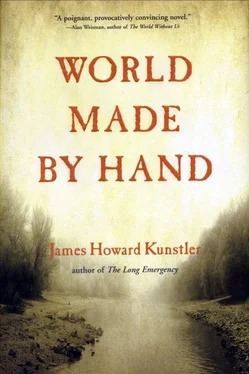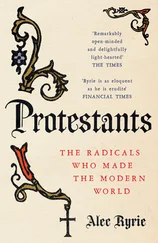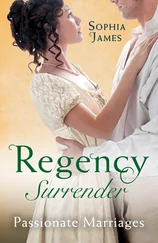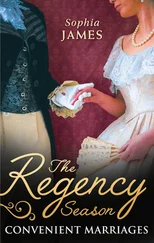I rode over in Terry Einhorn’s wagon with Leslie and her cello, Eric Laudermilk, and the Russos. Eric and I broke out our instruments en route, playing “Sail Away Ladies” and “Grey Eagle,” and some other lively numbers as we rode past the vacant car showrooms and strip mall ruins at the edge of town. Leslie kept her cello under wraps since the rig had no springs to speak of. Eric was him self a cidermaker of some distinction, and we traded slugs from the bottle he brought along, so we were already in a mellow frame of mind when Terry followed the rest of the wagons into one of Bullock’s new-mown hay fields where we hitched them to picket lines for the evening.
Bullock had strung colored Christmas bulbs all around the big circular drive between the barns, the workshops, and his house. It reminded me of the patio of a popular bar in Key West where I had gotten drunk a long time ago. Many of the Union Grove people were not aware that Bullock had his own hydroelectric setup, and as they were informed, their reactions ran from amazement to veiled jealousy. Sam Hutto just goggled at the lights like a kid at a carnival. I heard Debra Gooding say to Maggie Furnival, “I don’t see why he can’t send some of that juice over our way-I’d pay the sonofabitch!”
A beverage bar was set up on a long table under the arbor off the kitchen, with pitchers of Bullock’s own cider, sparkling and jack, and beer, and jugs of whiskey, and a vast punchbowl with some sweet, potent brew flavored with lemon verbena and raspberries. Across the way from the bar stood more long tables groaning with puddings, new potato salad, sugar snaps, radishes, pickles, sauerkraut, creamed new onions, corn bread, cakes (real cakes made with wheat flour), pies (ditto the flour), berry crumbles, cookies and confections, butternut fondants, even a tray of fudge made from chocolate—an ingredient that few of us had seen for some years. Among all these things the Bullocks had placed enormous bouquets of purple loosestrife, now coming into bloom wherever the ground was damp, and black-eyed Susans. Removed from the center of things, where the smoke would not be bothersome, they had set up a barbeque operation. Over one fire, a pig roasted on an iron spit turned by a teenage boy who nipped at a cup of something as he worked the crank. Over another fire, a Bullock servant wrangled rows of beefsteaks on a steel mesh grill. Next to him, yet another Bullock man turned sausages with tongs. Meanwhile, the procession of wagons kept rolling into the adjacent hay field, and a steady stream of townspeople and New Faith people entered the courtyard until the outdoor room grew crowded. The aroma of grilling meat seemed to affect the people like a powerful drug, as much as their first stimulating drinks of the evening. For the first time since they came to town, the New Faith people of both sexes mixed openly and easily with the regular Union Grovers and Bullock’s folks. The din of conversation was as intoxicating as the beverages.
Here and there around the big circular drive, barrels stood on end, each presenting a deployed basket of-what?-triangular corn tortilla chips of the kind that used to be manufactured by the great snack corporations of yore and were the ubiquitous national party food until that part of our history ended. Evidently Bullock’s cooks had made them from scratch for the occasion, along with a pickled hot pepper condiment—salsa!—to scoop up. The sweet herbaceous aroma of marijuana also began wafting around the courtyard. I saw Bullock himself take a hit on a pipe passed by Todd Zucker. A few of the New Faith men indulged too.
I had a toke or two myself, on top of the cider coming over and a tumbler of Bullock’s own since I got there, and I was reaching a plateau of expansive amiability, shall we say, when Andy Pendergast took me by the elbow into the carriage barn.
“Isn’t this great?” he said, excited as a little kid.
“It’s something, all right.”
The vehicles were removed from the barn for the evening and the place was all cleaned and beautifully lighted with those strings of little white minibulbs that fancy restaurants used to always put in their potted fig trees. Along the far side of the enormous room, going lengthwise, a plank stage was set up. The lumber was fresh cut. You could smell it. Somehow Bullock had come up with a sound system-four microphones on boom stands and two speakers at the sides coming out of a one-hundred-watt amp with a mixer. We tested the damn things and they actually worked. There was no piano, however, so Andy and I went to get his harmonium out of the wagon he’d come in.
On the way back, we heard that they were serving hot dogs in real wheat flour buns, and I went over to check it out as soon as we had Andy’s keyboard set up. You could have your dog with sauerkraut or sweet pickle relish and a coarse, grainy mustard. It was just like Bullock to serve such a thing for the sheer theatricality of it, to demonstrate how the old luxuries were all available at his plantation, in case anyone was thinking of coming over to live there and work for him. The way the crowd carried on, you’d think these were the greatest culinary delicacies ever contrived by mankind. The truth was Bullock’s hot dogs were far superior to any commercial hot dog I’d ever had back in the old days. Everything was handmade, including the sauerkraut and the mustard. The dogs themselves tasted more like bratwursts, and the buns were just out of the oven. The fact that so many of us were either drunk or stoned or both made them seem even more amazing, I suppose. Anyway, I ate two: one with kraut and mustard and one with sweet relish, and when I was done I went and got a chunk of beefsteak the size of my hand.
By now, a dense purple twilight had gathered and the courtyard took on an enchanted glow. The stars came out, fireflies began twinkling among the colored lights, and the moon was rising above the woods behind the field full of wagons. None of the New Faith women-thirty-five of them altogether-were older than middle age and most of them in their twenties, with a few apparently older teens, including the shy, pretty girl I saw that night we first came across Brother Jobe in the wagon, coming back from fishing. The New Faith women dressed differently than our people. They wore a kind of uniform: a long, herb-dyed linen skirt and a sun-bleached white muslin blouse buttoned primly at the throat. The only real difference between them was in the sleeves. Some long, some short, and some no sleeves. But their figures were on display despite the superficial modesty. They apparently did not wear anything in the way of underwear. Perhaps they dressed for the summer heat, but their muslin blouses were surprisingly sheer, and here and there, if one of them was standing in the light a certain way, you could see her figure outlined through the fabric. Our women were generally older, and despite the decolletage on display, and the variety of fabrics and styles they wore, they came off more modestly than the New Faithers.
I was standing by the bar, holding a piece of beefsteak between my thumb and forefinger, trying not to look like a slob, with a glass of Bullock’s excellent sparkling hard cider in the other hand, when one of the New Faith ladies came up to me.
“Hello there,” she said. “My name’s Annabelle.”
“You’re a handsome creature, Annabelle,” I said. It was the weed and the cider talking. I was feeling frisky for the first time in years.
“Are you somebody’s husband?”
“No, ma’am,” I said. I felt a passing twinge of guilt for failing to say I used to be.
“Do you know the Lord?”
“Bullock and I go back through the years.”
“No, the Lord of heaven and earth,” she said.
“Oh, him. Jesus.”
“Yeah, him.”
Читать дальше












